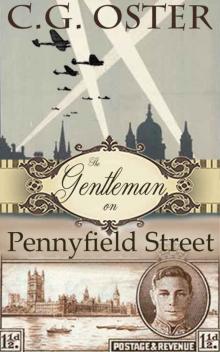- Home
- C. G Oster
The Gentleman on Pennyfield Street Page 4
The Gentleman on Pennyfield Street Read online
Page 4
"Most are," she said.
"Found on Pennyfield Street two days back."
"Are you a relative?"
"No," Dory said. "I am investigating some inconsistencies."
The nurse turned her head, unimpressed.
"I'm with the ATS," Dory continued and produced her identification card. In no way was she supposed to use it in this way, but she knew she wasn't getting past this nurse otherwise.
"The ATS don't usually deal with bodies."
"As I said there have been some inconsistencies we need to clarify."
Giving Dory a narrow-eyed look, the nurse pulled over a heavy tome and looked through. "Day before yesterday, you said."
"No, the one before."
The woman turned a book leaf back. "There were four."
"It's one of the men I'm here about. The older gentleman."
"We have no identity registered."
"Are you able to identify him?"
"Not at this point."
The nurses gaze lingered. "I'll call Doctor Hannover to see if he can have a quick word with you. Take a seat."
With a smile, Dory retreated and looked up at the clock. She had fifty minutes until she needed to leave. Hopefully she could speak to this doctor before that.
Most of the people around her were grieving, or in shock. Some simply stared into space. One was telling off her children for fussing. Dory watched these relatives of the people killed. There were also other types that came and went behind the desk, clerical persons carting off armloads of paper apparently stacking up behind the desk.
Dory almost fell asleep in the cool, silent atmosphere. The only person talking was the woman on the phone behind the desk.
"Miss Sparks," a woman finally said and Dory's eyes flew open.
"Yes," she said and joined the woman.
"Come with me." She was led through a curved archway and almost bumped into a body lying under a sheet. "Mind your step."
It wasn't the only body lying in the corridor. The whole corridor was lined with bodies. And the room she walked past had bodies lying in rows all throughout the floor, not covered in sheets—covered in dirt and blood.
"We're struggling a bit with capacity," she called over the shoulder as if it was something she said to everyone. "In here."
Dory was shown into a room where most of the corpses were on tables, lying under sheets. The far wall was covered with doors polished almost to a mirror finish. A man stood with a bloodied apron, eating a sandwich. "Miss Sparks," he said, laying the sandwich down on a tray.
"I understand the ATS is interested in one of the bodies we have. A man in his sixties from Pennyfield Street. We have no identity for him."
"There have been some inconsistencies about his presence. I am trying to identify him."
"Well, you best hurry, we don't have room for the cadavers to hang around. Mr. Green Corduroys? When we don't have a name, we tend to use clothing or any distinguishing features." The man walked over to the wall of small doors and opened one, pulling the tray out.
There was the man, lying in his green trousers. A clipboard hung on the inside of the door. "No identification and the constable couldn't identify him."
"Is it not remarkable that he was pulled out of the building with so little dust on him?" Dory asked.
"Now that you mention it, it is unusual. Not so unusual if hit by shrapnel. Can happen even a hundred yards away from the actual explosion, but the ones that go down inside buildings are usually mincemeat." Dory winced at the expression. "Sorry, you form a black sense of humor working here."
"No doubt."
"Most of his injuries were about the head. Not usual. Not much about the body, which is also unusual, so I can perhaps concur that there are some inconsistencies. House coming down tends to do wretched thing to limbs, but his are all intact. If I didn't know better, I wouldn't have guessed he'd come out of a collapsed building. But sometimes they simply happened to be protected by something large like a wardrobe. Usual, but it can happen. Quite a few people hide in wardrobes. Usually the elderly. Rarely works out well against a bomb." He flipped the yellow paper on the clipboard. "No ID, no particular marks, nothing in his pockets. Well-fed appearance. Had an appendectomy. Quite recently. Unusual in a man that age. High mortality with appendicitis in the elderly, so he must have had a strong constitution, I would guess. Other than his fine sense of fashion, there is nothing more to say about him. Could have come from anywhere if no one in the neighborhood knew who he was. Happens quite often. You'd be surprised how many people are not where they should be when the bombs start dropping."
Doctor Hannover was certainly a chatty man. Seemed he took the opportunity when someone could listen.
With a bang, he rolled the tray back and shut the door. "Sorry, can't be of any more help."
"Thank you for your assistance, Dr. Hannover. I will hopefully return with an identity."
"When you find out, report it to the Imperial War Commission. They are keeping the records. Mr. Green Corduroys is scheduled to be transported to Brookwood tomorrow morning."
"I see," Dory said. "I don't think I will have an identity for him by then."
"Best of luck with your investigation," he said, returning to pick up his sandwich.
With a smile, Dory veered through the obstacle course of cadavers to exit the room, wishing herself out of there as soon as possible. It was the first time she had ever been inside a morgue and although it was interesting, she felt the unease traveling up her spine. Poor Mr. Green Corduroys. Or perhaps it was because she understood the body of Mr. Corduroy wasn't where it was supposed to be. In fact, he may not have been in the building at all when it collapsed, and placed there later. It was the perfect way of getting rid of a body. Obviously, not conclusive evidence, but it was a suspicious situation.
Even more so, it was curious that the man had nothing in his pockets. Who visits somewhere they shouldn't be without anything in their pockets? A key, at the very least, not to mention a wallet.
So the only things to go on were his clothes, which truly were not all that unusual. They spoke of a retired man with a modest budget for clothing. Hardly the height of fashion. Then there was the appendectomy. People had the appendixes out on a fairly regular basis, but there would be a record somewhere of it. Finding it might not prove possible, but it was the most solid lead she had.
Chapter 8
THE CLEAR NIGHT PLUNGED the temperature and Dory had to don her woolen fingerless gloves. The moon lit up the river and across the other bank. Jumping from one foot to the next, Dory tried to keep warm. For once they could see the barrage balloons above them, floating in the sky in whatever direction the wind blew them. They looked like small, dark spots in the sky.
The voices of people were heard down on the street, out for the evening in this apparent reprieve from the air raid shelters. A moment of freedom. Dory hoped it would last.
As for herself, she was putting off doing what she'd promised herself she would do: write a letter to Captain Ridley. Why she was putting it off, she had no idea? She just didn't know what to say. Everything she considered saying just sounded stupid. But equally, she hated being cowardly and this was nothing but sheer cowardice.
Vera sat in a chair and stretched her arms, yawning. Betsy was downstairs with the radio. They weren't needed, but they still had to be there. Things could change very quickly.
Grabbing the clipboard Dory had placed on the other chair, she walked over to the edge of the roof and crouched down to sit with her back against the wall. Pulling out the candle she had in her pocket, she lit it and put it down next to her.
"The wardens will have your hide for that candle," Vera said.
"Which is why I am hiding here in the corner. They'll never see it." It was strange how they were admonished for a small, insignificant light like a candle, when they manned the biggest light of all. Besides, there were no planes. Nothing was reported from the listening posts or radar stations along the coast.
A little candle wasn't going to harm anyone, but the people enforcing the blackout where almost maniacal in their zeal, handing out fines to people lighting their cigarettes on the street.
Clipping the cream-colored piece of paper to the board, Dory stared at it. She still had lovely stationery left over from her days in St. Tropez. It would run out soon and she would have to resort to the tissue-thin writing paper that was available these days.
Dear Cpt Ridley, she started, but then didn't know how to proceed.
I am glad to hear you are well. We are here, as well, although there are fewer and fewer houses still standing with each night. The Germans are relentless and the colder temperatures aren't putting them off.
In a sense, she knew she was babbling.
Some are taking advantage of the conditions. Mostly people simply taking advantage, such as looting, but I fear it is also the opportunity for worse things amongst our dark streets and the general confusion. There has been some suggestion that a crime has been committed a street or so down from where I live, but as of yet, there is no identity of the man found.
Dory decided not to go into any further details on the subject of the body in Pennyfield Street. The truth was that the identity of the man might never be found, so he was simply a person that was missing, presumed dead.
"There's a red light at the end of the street," Betsy said, appearing on the roof. "I saw it out the window."
"What light?"
"There," Betsy said, walking to the edge of the building not far from where Dory was sitting. Blowing her candle out, Dory stood up and tried to see this red light. Lights of any kind were unusual—red lights even more so.
"That's the gas detector," Vera said with a gasp. "We're being gassed. Where's the gasmask?"
"It can't be," Dory said. "There's been no one dropping any bombs."
"That's what I thought," Betsy said.
"Doesn't mean we're not being gassed. There's Germans crawling all over the place for all we know. They could have just released it rather than drop it from a plane," Vera challenged.
"I don't smell anything," Dory said.
"I'm not putting that blemmin' gas mask on. It stinks."
The gas masks were uniquely unpleasant.
"It can be malfunctioning for all we know," Dory said. "It's the most likely conclusion under the circumstances."
"Maybe I better call it in," Betsy said. "If there's more than one going off around the city, then there might be a problem."
Betsy disappeared downstairs. There were so many people out and about that night. It would be the perfect time to release some chemical that choked people. There wasn't even the scent of anything unpleasant in the air, though. It had to be a malfunction. Still, fear gripped deep in her belly and it was only the sheer unpleasantness of the gas masks that kept her from pulling one on.
They were supposed to carry them everywhere. The war office feared the Germans using mustard gas on them, but so far, they hadn't, which was a mercy. It might be a much more unbearable war if they couldn't breathe the very air.
A shudder crept down Dory's spine.
"They say it's nothing to worry about," Betsy called and relief washed over Dory. At times, it felt as though she had no fear left in her—that she'd exhausted it all. When the bombs started falling, she had to focus on her task at hand or her thought would get lost in the horror that was happening out in the city.
As then, she felt the after-effects of fear on her body and she closed her eyes and tried to calm herself, remembering swimming in the warm Mediterranean Sea with its sparkling blue water. That usually did the trick. It was hard to imagine that was only mere months ago. It seemed like a lifetime.
Returning to her previous sitting position, she lit her candle again and reread what she'd written so far. She'd been on a roll for a while, but it had dried up now and she couldn't formulate a single thing to say.
It will be nice to see you when you arrive in London. Please keep well.
That would simply have to do. Unclipping the note, she tucked it away in her jacket to put in an envelope when she got home. It would be the job for the afternoon.
"They're coming!" Betsy yelled from downstairs. "Southwest. Ten minutes."
Whoever told Betsy, told the air raid wardens too, because seconds later, the whine of the sirens started, growing louder and louder. Yelling started down in the street as all the people who'd been enjoying a night out had to abandon their activities and find shelter.
Looking up at the sky, Dory could see that it was clouding over. The barrage balloons weren't as visible now. The Germans literally followed the cloud. They must have been waiting for it—maybe even circling until they could pounce. Dory didn’t know the details of how they operated.
Dory turned on the lever that powered the light and it flickered before shining. The light grew in strength as the light warmed. It made a buzzing sound and it wouldn't take long for it to be too hot to touch.
The planes were heard in the distance, that awful droning sound. The other searchlights switched on across the river and further along, traveling across the sky. They weren't having a night of reprieve after all. And by the sounds of the drones, it was a large wave of planes. It was going to be a mess of a night.
The first bombs dropped over toward the western part of the city, which was unusual. Normally they focused exclusively on the east. The bombs went off with golden sparkles, lighting up the skyline, along with the hot slugs of the anti-aircraft fire. The red of the fires came later.
Dory quickly wound the searchlight in the direction the planes were coming from.
"Here we go," Vera said. "Round I've-still-lost-count."
The airplanes flew overhead, the sound of them almost reverberating down Dory's body, then the whistling sound of bombs dropping, and also the silent parachute mines. The falling ones hit first, scattering across the landscape behind them, then the second wave of bigger explosions from the parachutes.
"Bastards," Vera yelled.
Dory refused to look and continued to search for a plane to target. The guns across the river were firing relentlessly, but sadly, they did little damage to the enemy in comparison to what the enemy did to them. At this point, though, Dory had lost any moral squeamishness about targeting an enemy plane for destruction. If she could shoot them all down, she would.
Finding a target, she stuck to it until the guns joined her, a trail of smoke finally coming from the plane. It was grim satisfaction striking one. It wouldn't make it back across the Channel, and Dory didn't care what happened to it or the pilot. Ideally it wouldn't hurt anyone other than the crew coming down.
Maybe a hardness had developed in her, she wondered.
Chapter 9
THE SMOKE IN THE AIR was pervasive. It stung Dory's throat and got into both her hair and clothes. People were out trying to deal with the latest round of destruction wreaked upon the city. There was a bombed out building down one of the side-streets, it's bricks strewn across the entire road.
Through the jumble of lorries and vans, she saw dusty lumps laid down on the street, and sighed. More senseless deaths.
Right now, though, there was one particular death she was dwelling on. The edifice of the Royal London hospital peeked through the roofline in the distance. No billowing smoke, so it had fared intact through the night. It couldn't be taken for granted that any specific building would be there the next day. It gave the world a strange feeling of transience that she'd never experienced before.
She'd just mailed the letter to Captain Ridley, but neither of them might be there anymore by the time it arrived. It was difficult to think about, so she tried not to. One day at a time; it was the only way to get through this.
As before, the hospital was busy, patients being brought in and discharged, visitors coming and going, and the rush of staff dealing with a workload far beyond what this hospital was built for.
With a slight shudder, she walked past the corridor leading to the morgue. Hopef
ully, she would not end up lying on the floor down there like so many others.
"May I help you?" a woman said behind a tall desk.
"I'm seeking records," Dory said and again produced her ATS identification.
"You'll have to go across the street. They're not kept here. Number ninety-four."
Dory thanked the woman, but the nurse had already moved onto the next person, so Dory returned to the clear day outside with its constant smoke haze. The carefree days of summer seemed so far away, but then she hadn't been carefree for a long time. The last time was perhaps when she'd started working as a maid in Wallisford Hall, before she'd understood that the world would descend into such a mess. Looking back, they had all seemed so unaware. There had been talk of war, of course, but no one truly believed it would happen.
Unfortunately, the buildings across the road were not clearly labeled and Dory didn't know which to enter. None of them were particularly inviting, with doorways that gave little away.
A man was walking toward the nearest doorway. "Pardon me," Dory stated. "I am looking for number ninety-four."
"Two down," the man said and disappeared into the door.
"Two down which way?" Dory called, but he was gone.
A fifty percent chance either way, so Dory tried the left first, entering a building that didn't have the look or smell of a hospital at all. In fact, there seemed to be very few people in this building. The main entranceway contained a staircase and a series of wooden doors. There was nothing to indicate where she needed to go.
After a moment of hesitation, she knocked on one of the doors and peeked inside, seeing an office.
"Yes?" a man said, sitting at a desk, a cigarette lit in his hand.
"Records?"
"Down the hall," he said, pointing with his cigarette. "All the way down the back."
"Right," Dory said with a smile before following the directions leading through three sets of double doors. A nurse smiled tightly as she came the other way, looking very out of place in her white uniform in this building.
Finally she reached a last set of double doors, where small round windows were inlaid on each. Peering inside, she saw a man sitting at a desk. Behind him were stands with files. This had to be the place.

 The Summerfield Bride
The Summerfield Bride Secrets at Wallisford Hall
Secrets at Wallisford Hall The Gentleman on Pennyfield Street
The Gentleman on Pennyfield Street Mischief in St. Tropez
Mischief in St. Tropez